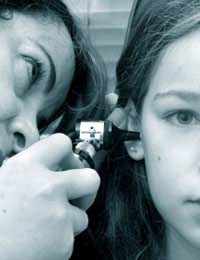Labyrinthitis

Inside of the inner ear is a complex maze of tiny passages that are all connected and filled with fluid; this is called the labyrinth.The purpose of the labyrinth is to help us achieve balance, adjust to motion and is involved in hearing function.The fluid within the channels sends signals to the brain and allows us to effectively manage movement, telling us when to turn, in which direction, how fast and how far.When the inner ear and labyrinth become inflamed or infected, labyrinthitis develops.
Causes Of Labyrinthitis
Normally this disorder is caused by a viral infection, after a cold or the mumps for example. More seriously, a bacterial infection is to blame, which will need specific treatment by your GP. Other causes of this condition included injury and trauma to the ear, head and neck, and your doctor may require some scanning procedures to rule out more serious injury.Long term alcohol abuse and prolonged or excessive use of certain medications have also been blamed for some occurrences of labyrinthitis.Signs And Symptoms Of Labyrinthitis
The most common symptoms experienced with this condition are dizziness and vertigo, or feelings of spinning. These occurrences can then trigger nausea, vomiting, visual disturbances and an inability to balance correctly.Sufferers of labyrinthitis have also reported tinnitus, headaches and light-headedness also.Labyrinthitis causes the person to feel unsteady, unsure of their surroundings and that either they or their environment is moving.Sufferers are likely to experience many of these symptoms and they can last for a short period, come in bouts or, unusually, can continue for some time.Some sufferers report that they experience these symptoms periodically on a long-term basis and that their quality of life can be seriously affected.
Treatment Options
Often, the body’s own natural defence mechanism, the immune system, will fight and beat the infection on it’s own, and the symptoms will be the only part of the illness needing treatment.Pain relief is normally required for headaches and to reduce fever brought on by the infection, along with medications to reduce sickness and dizziness, which will normally be prescribed by your GP.Fluids will be needed to remain hydrated, but these should probably be taken little and often, especially if nausea and vomiting are being experienced.Bed rest will normally be required initially, in a cool and darkened place, with some relaxation techniques such as meditation, soft music or massage to allow the body to relax.Speak to your GP about the recommended exercise plans aimed at reducing the symptoms of labyrinthitis as these have been designed by professionals specifically targeted at managing the associated symptoms.
Avoidance of stimulants such as nicotine, caffeine and alcohol is strongly advised and sufferers should never attempt to drive or operate machinery if dizziness and vertigo are apparent.Often, your GP will refer for tests to rule out other serious illnesses if there is no apparent cause for the dizziness and vertigo such as a previous illness or injury.
Labyrinthitis can be a very distressing disorder for the sufferer and the associated symptoms can significantly alter a person’s quality of life.
- Psoriasis and the Ear
- Common Vestibular Disorders
- Dizziness: Is it Caused by a Virus?
- Cysts and Tumours in the Ear
- Pressure Sores and the Ears
- Head Trauma and the Ear
- Allergies and Ear Health
- What is Glue Ear?
- Usher's Syndrome: Deterioration of Sight and Hearing
- The Effects of Over Exposure to Water: Surfer's Ear
- Acoustic Neuroma: Benign Tumour from Auditory Nerve
- Cauliflower Ears
- Sensorineural Deafness and Noise Damage
- Autoimmune Inner Ear Disease
- Cholesteatoma
- Perforated Eardrum
- Large Vestibular Aqueduct Syndrome
- Otitis Media and Infection of the Middle Ear
- Barotrauma
- Vertigo and the Inner Ear
- Mastoiditis
- Swimmer's Ear
- Objects In The Ear
- Ear Canal Blockage
- Tinnitus and Treatments Available
- Meniere's Disease and the Inner Ear
- Ear Infection


Re: Types of Ear Surgery
My child is born with deaf. So what should i do. Which treatment should i take to my child
Re: How Your Genes Shape Your Ear Lobes
My 2 month old has one free earlobe and his other ear has a half attached earlobe why? Should I be concerned?
Re: I Feel Dizzy and My Ear Itches: What Does it Mean?
I have noticed my ears are producing more sticky staff, itching and in the middle of last year I…
Re: Can Ear Wax Be Removed by Vacuum?
Vacuuming caused a 30% hearing loss. Don't allow it. Find a dr or audiologist who avoids it.
Re: Cysts and Tumours in the Ear
I had a pollock in my ear. can they regrow ?
Re: Grommets and Your Ear
@Ella - I'm afraid we can't give direct medical advice. The best option you have is to visit your GP and hope he/she will be able to help…
Re: Grommets and Your Ear
I had grommets when I was 2 and 5, a few weeks ago I found out I have scarring and 1 of my grommets are still in my ear meaning I had it in…
Re: Can Ear Wax Be Removed by Vacuum?
I had an ear wax removal procedure done at the Loma Linda, Ca Va facility. When the tech was vacuuming out the wax in my…
Re: Cysts and Tumours in the Ear
@CarrolA - I have no knowledge of your condition or what it might be. But if you want a quicker appointment, and peace of mind,…
Re: Cysts and Tumours in the Ear
I woke up one morning about five weeks ago with a feeling that my ear was blocked. A strange additional symptom is that every word…